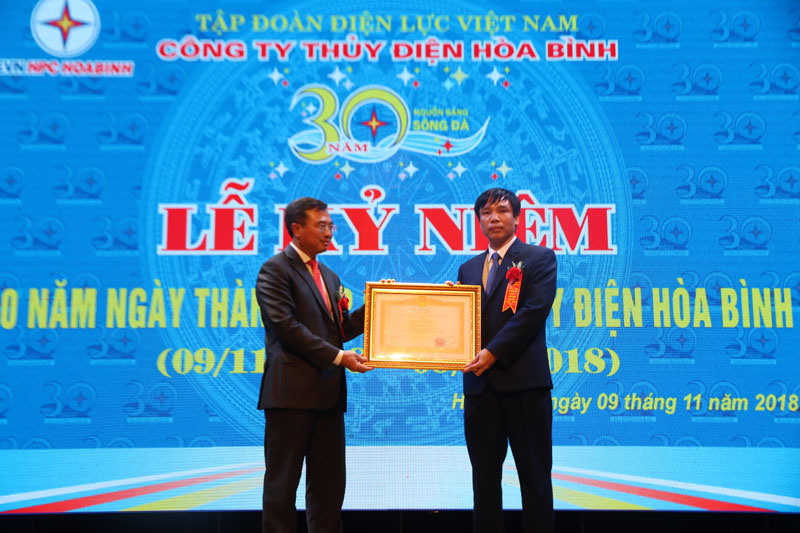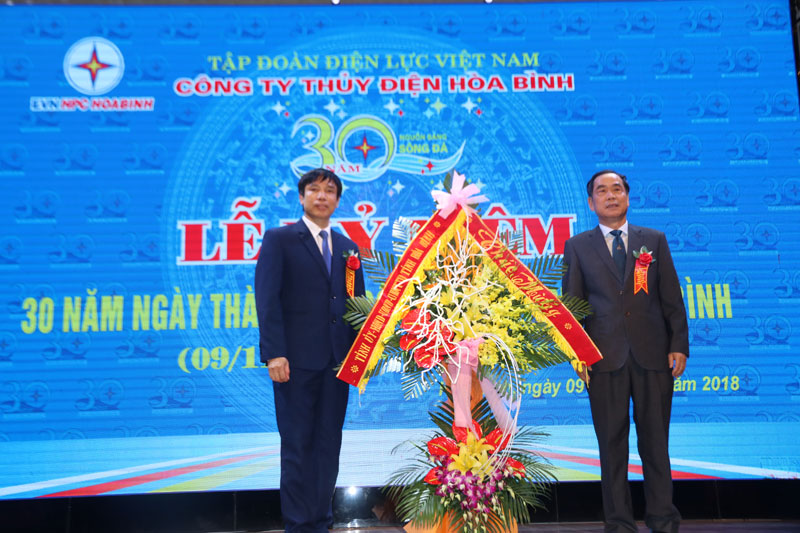
(HBO) – The Hoa Binh Hydropower Company has organised a ceremony to celebrate its 30th founding anniversary (November 9, 1988-2018), marking a path full of hardships and challenges to make the Hoa Binh Hydropower Plant, managed by the company, one of the largest hydropower works in the Southeast Asian region.
Attending the ceremony were Deputy Minister
of Industry and Trade Hoang Quoc Vuong, Chairman of the Member Council of the
Electricity of Vietnam (EVN) Duong Quang Thanh, Permanent Vice Secretary of the
Hoa Binh provincial Party Committee and Chairman of the provincial People’s
Council Tran Dang Ninh, and Vice Secretary of the provincial Party Committee
and Chairman of the provincial People’s Committee Nguyen Van Quang.

Deputy Minister of Industry and Trade Hoang Quoc Vuong presents the Prime
Minister’s certificate of merit to Hoa Binh Hydropower Company.

Chairman of the provincial People’s Committee Nguyen Van Quang presents flower
basket to Hoa Binh Hydropower Company on the occasion of its 30th founding anniversary.
To date, the plant’s accumulated electricity output has reached nearly 230
billion of kWh. Annually, the company contributes 1.2-1.4 trillion VND to the
budget of Hoa Binh province, and 300-450 billion VND in natural resources tax
to Son La province. It pays more than 200 billion VND in forest environment
service fees to six provinces in the upstream Da River per year, while engaging
in regulating floods effectively, ensuring safety for lower areas and
minimizing damage caused by downpours and floods.
Since the Hoa Binh Hydropower Plant was put into use, no flooding has been
recorded in the northern delta region, with sufficient water for agricultural
production during the dry season. In 2017, the plant was officially recognised
as an important work related to national security.
On the occasion, the Prime Minister presented a certificate of merit to the Hoa
Binh Hydropower Company for its outstanding achievements recorded over the past
years. In addition, two units and four individuals of the company received
certificates of merit by the Ministry of Industry and Trade./.
The Standing Board of the Hoa Binh provincial Party Committee has agreed in principle on a proposal by the Standing Board of the Party Committee of Hoa Binh city to gather feedback on the city’s 1:2000 zoning plan, which forms part of its broader urban development strategy.
Hoa Binh province has made notable progress in public administration reform and digital government development, with the satisfaction index among citizens and businesses reaching over 84%, according to recent government evaluations.
Thanks to great efforts by local authorities in recent times, the governance and public administration performance of Mai Chau district has been significantly improved.
In the afternoon of June 6, the Party Committee, the People's Council, the People's Committee and the Fatherland Front of Lac Son district solemnly held a meeting to celebrate the 139th anniversary of the district's founding (1886–2025) and the 79th anniversary of the establishment of the district's Party Committee (1946–2025). There was the attendance of Mr. Bui Van Thang, the Vice Chairman of the Provincial People's Council; Mr. Quach Tat Liem, the Vice Chairman of the Provincial People's Committee; Ms. Dang Bich Ngoc, the Deputy Head of the National Assembly Delegation of the province; as well as the former leaders of the province and district through various periods, who are the natives of the district.
Implementing the Politburo’s Resolution No. 57-NQ/TW on breakthroughs in science – technology, innovation, and digital transformation is a golden opportunity for the northern mountainous province of Hoa Binh to renew growth model, improve competitive edge and shorten digital gap.
Resolution 57-NQ/TW, issued by the Politburo on December 22, 2024, identifies sci-tech, innovation, and digital transformation as strategic breakthroughs to build a developed and prosperous nation. In Hoa Binh province, this spirit is not just a slogan, it’s being put into action through concrete initiatives that form a "new development triangle”: digital citizenship, digital economy, and digital administration.




